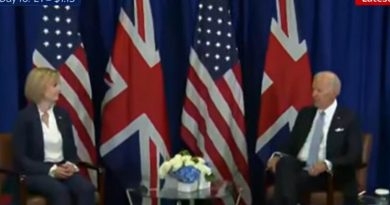ANC’s Labor Ally Says Party Is Failing to Act on S. Africa Graft
Sign up to our Next Africa newsletter andfollow Bloomberg Africa on Twitter
A leader of South Africa’s biggest labor movement accused the ruling African National Congress of failing to act on corruption, highlighting the fragility of a political alliance that’s been in place since the end of apartheid.
“What is most concerning is the ANC’s refusal to engage on extending the ban on public servants and the executive from doing business with the state,” Bheki Ntshalintshali, general secretary of the Congress of South African Trade Unions, wrote in a column in the Sunday Times. “The longer the ANC shies away from addressing the root causes behind the scourge of corruption the more it continues to allow the looting.”
For the last two years South Africa has been mired in state-backed inquiries into corruption within government and some key state owned institutions and companies, following the scandal-ridden tenure of former President Jacob Zuma. This year government officials, including President Cyril Ramaphosa’s spokeswoman, were linked to allegations of corruption related to tenders for personal protective equipment needed to combat the coronavirus.
The labor movement has supported the ANC in elections since the first democratic vote in 1994 together with the South African Communist Party in an arrangement known as the Tripartite Alliance.
Tax Opposition
Writing after a meeting of the ANC’s leaders last weekend, Ntshalintshali also said the union will oppose any plan to raise taxes as this would unfairly squeeze the working poor. Officials will present the budget proposal on Feb. 24.
He said Cosatu, which has 1.8 million members, instead calls for higher corporate tax, an increase in income tax for those earning more than 1.5 million rand ($100,000) a year and wealth taxes on inheritances.
Ntshalintshali also criticized the:
- decision to freeze government worker wages
- failure of the central bank to broaden its mandate to target employment and economic growth, introduce foreign exchange controls and force banks to lend money to priority sectors. The bank kept its key rate unchanged this month
- failure to hold government officials to account for their shortcomings in implementing ANC policies
- lack of a sustainable funding model for indebted state companies.
Though the ANC has endorsed “many progressive policies” in recent years, the latest meeting “failed to set timelines and provide details on the many plans that were adopted,” he wrote.
Ramaphosa has made a number of pledges that have remained unfulfilled since taking power in February 2018. They range from the sale of additional spectrum to bring down the cost of data to an invitation to private companies to build renewable energy plants and the failure to stabilize the 464 billion-rand debt of state power utilityEskom Holdings SOC Ltd.
“The way the state is designed leaves a lot to be desired,” Ntshalintshali wrote.“Some political deployees are fatigued, ill-disciplined and downright not competent to provide leadership during this time of crisis.”
Source: Read Full Article

